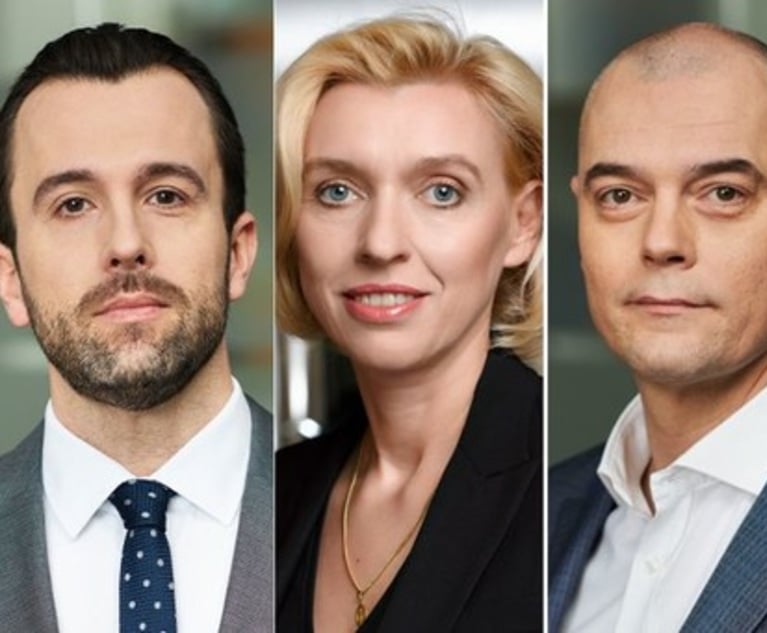 The European Court of Justice in Luxembourg. Photo: EQRoy/Shutterstock.com
The European Court of Justice in Luxembourg. Photo: EQRoy/Shutterstock.comFacebook Must Remove Hateful Posts Worldwide, Top EU Court Rules
The decision means internet platforms will be required to take more responsibility for patrolling their sites for content that has been ruled illegal. Facebook says it "raises critical questions around freedom of expression."
October 03, 2019 at 01:06 PM
3 minute read
In a major blow to big internet platforms, Europe's top court said on Thursday that an individual country can order Facebook to take down posts, photographs and videos and restrict global access to that material – a move that places more responsibility on internet platforms to patrol their sites for content ruled illegal.
The decision by the European Court of Justice means social networks like Facebook will be required to remove defamatory material hosted on their sites if they are aware that the content is harmful to an individual's reputation. It also means national authorities can ask social networks and other platforms to take down material that has been judged to be defamatory or "equivalent" to defamatory content.
The EU court had been asked for a ruling to clarify EU law relevant to a case referred by the Austrian supreme court that involved a Green party politician, Eva Glawischnig-Piesczek. The politician, a former leader of Austria's Green party, had sued Facebook in Ireland over content published on the company's platform that contained remarks that were harmful to her reputation.
Glawischnig-Piesczek had sought to have Facebook remove disparaging comments about her that had been posted on an individual's personal page and also to have removed "equivalent" messages posted by others. She argued that Facebook needed to delete the material in the country and limit worldwide access.
With Thursday's ruling, internet platforms such as Facebook will likely be required to take more responsibility for patrolling their sites for content that has been ruled illegal.
"This judgment raises critical questions around freedom of expression and the role that internet companies should play in monitoring, interpreting and removing speech that might be illegal in any particular country," Facebook said in a statement issued after the ruling.
"It undermines the longstanding principle that one country does not have the right to impose its laws on speech on another country. It also opens the door to obligations being imposed on internet companies to proactively monitor content and then interpret if it is 'equivalent' to content that has been found to be illegal."
Facebook had previously warned that a ruling that allowed individual countries to force internet platforms to delete material elsewhere would limit free speech, as they would have to use automated content filters that are not highly sophisticated, and this could lead to the takedown of legitimate material.
But others had said Facebook and others needed to do more to control hate speech, defamatory posts and untrue content on the web.
The court on Thursday said Facebook was not liable for the disparaging comments posted but it had an obligation to take down the posts after a court ruled them defamatory. Facebook, it said, "did not act expeditiously to remove or to disable access to that information".
The ruling, which came from the EU's top court, cannot be appealed.
This content has been archived. It is available through our partners, LexisNexis® and Bloomberg Law.
To view this content, please continue to their sites.
Not a Lexis Subscriber?
Subscribe Now
Not a Bloomberg Law Subscriber?
Subscribe Now
NOT FOR REPRINT
© 2024 ALM Global, LLC, All Rights Reserved. Request academic re-use from www.copyright.com. All other uses, submit a request to [email protected]. For more information visit Asset & Logo Licensing.
You Might Like
View All

The SLAPP Heard Around the World: SDT Hearing Draws Industry Attention
5 minute read

CMS Wistrand Hires Former Linklaters Nordics MP and Bird & Bird's Danish Hire
3 minute readTrending Stories
- 1Wrongful Death Case Against Adult Daycare Sparks Call for State Regulation
- 2Attorney Claims He Was Denied Firearm Carry Permit Because of His Views on Middle East Conflict
- 3Judges’ ‘Unretirements’ After Trump's Win Spark Dubious Ethics Complaints
- 4High Court Revives Kleinbard's Bid to Collect $70K in Legal Fees From Lancaster DA
- 5AG Had No Authority to Take Control of Paterson PD, Appellate Division Says
Who Got The Work
Michael G. Bongiorno, Andrew Scott Dulberg and Elizabeth E. Driscoll from Wilmer Cutler Pickering Hale and Dorr have stepped in to represent Symbotic Inc., an A.I.-enabled technology platform that focuses on increasing supply chain efficiency, and other defendants in a pending shareholder derivative lawsuit. The case, filed Oct. 2 in Massachusetts District Court by the Brown Law Firm on behalf of Stephen Austen, accuses certain officers and directors of misleading investors in regard to Symbotic's potential for margin growth by failing to disclose that the company was not equipped to timely deploy its systems or manage expenses through project delays. The case, assigned to U.S. District Judge Nathaniel M. Gorton, is 1:24-cv-12522, Austen v. Cohen et al.
Who Got The Work
Edmund Polubinski and Marie Killmond of Davis Polk & Wardwell have entered appearances for data platform software development company MongoDB and other defendants in a pending shareholder derivative lawsuit. The action, filed Oct. 7 in New York Southern District Court by the Brown Law Firm, accuses the company's directors and/or officers of falsely expressing confidence in the company’s restructuring of its sales incentive plan and downplaying the severity of decreases in its upfront commitments. The case is 1:24-cv-07594, Roy v. Ittycheria et al.
Who Got The Work
Amy O. Bruchs and Kurt F. Ellison of Michael Best & Friedrich have entered appearances for Epic Systems Corp. in a pending employment discrimination lawsuit. The suit was filed Sept. 7 in Wisconsin Western District Court by Levine Eisberner LLC and Siri & Glimstad on behalf of a project manager who claims that he was wrongfully terminated after applying for a religious exemption to the defendant's COVID-19 vaccine mandate. The case, assigned to U.S. Magistrate Judge Anita Marie Boor, is 3:24-cv-00630, Secker, Nathan v. Epic Systems Corporation.
Who Got The Work
David X. Sullivan, Thomas J. Finn and Gregory A. Hall from McCarter & English have entered appearances for Sunrun Installation Services in a pending civil rights lawsuit. The complaint was filed Sept. 4 in Connecticut District Court by attorney Robert M. Berke on behalf of former employee George Edward Steins, who was arrested and charged with employing an unregistered home improvement salesperson. The complaint alleges that had Sunrun informed the Connecticut Department of Consumer Protection that the plaintiff's employment had ended in 2017 and that he no longer held Sunrun's home improvement contractor license, he would not have been hit with charges, which were dismissed in May 2024. The case, assigned to U.S. District Judge Jeffrey A. Meyer, is 3:24-cv-01423, Steins v. Sunrun, Inc. et al.
Who Got The Work
Greenberg Traurig shareholder Joshua L. Raskin has entered an appearance for boohoo.com UK Ltd. in a pending patent infringement lawsuit. The suit, filed Sept. 3 in Texas Eastern District Court by Rozier Hardt McDonough on behalf of Alto Dynamics, asserts five patents related to an online shopping platform. The case, assigned to U.S. District Judge Rodney Gilstrap, is 2:24-cv-00719, Alto Dynamics, LLC v. boohoo.com UK Limited.
Featured Firms
Law Offices of Gary Martin Hays & Associates, P.C.
(470) 294-1674
Law Offices of Mark E. Salomone
(857) 444-6468
Smith & Hassler
(713) 739-1250







